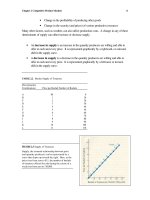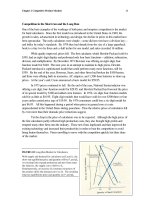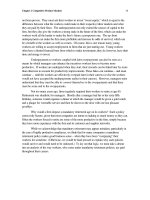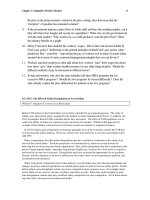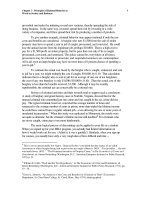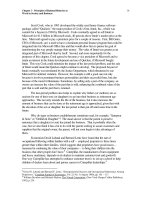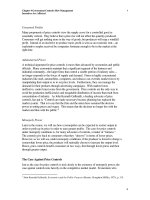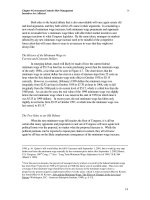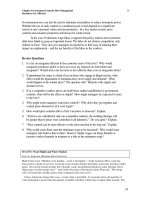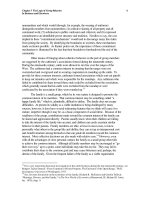Tài liệu Microeconomics for MBAs 16 pptx
Bạn đang xem bản rút gọn của tài liệu. Xem và tải ngay bản đầy đủ của tài liệu tại đây (42.78 KB, 10 trang )
Chapter 5 The Logic of Group Behavior
In Business and Elsewhere
19
tough boss monitoring all workers, and unmercifully penalizing those who dare shirk,
Jane will find that she is more than compensated because her fellow workers have also
quit shirking. Instead of being in an unproductive firm, surrounded by a bunch of other
unproductive workers, each receiving a payoff of 50, she will find herself as part of a
hard-working, cooperative team of workers, each receiving a payoff of 100.
The common perception is that bosses hire workers, and in most situations this is
what appears to happen. Bosses see benefits that can be realized only by having workers,
and so they hire them. But since it is also true that workers see benefits that can be
realized only from having a boss, it is reasonable to think of workers hiring a boss, and
preferably a tough one.
Table 5.2 Shirking in Large Worker Groups
Other Workers
None shirk Some shirk All shirk
Don’t shirk 100 75 25
Jane
Shirk 90 65 15
Actual Tough Bosses
The idea of workers hiring a tough boss is illustrated by an interesting, though probably
apocryphal, story of a missionary in 19th century China. Soon after arriving in China, the
missionary, who was then full of enthusiasm for doing good, came upon a group of men
pulling a heavily loaded barge up a river. Each man was holding on to a rope attached to
the barge as he struggled forward against the river’s current, while on the barge was a
large Chinaman with a long whip with which he lashed the back of anyone who let his
rope go slack. Upon seeing this, the missionary experienced a surge of indignation and
rushed up to the group of Chinamen to inform them that he would put an end to such
outrageous abuse. Instead of being appreciative of the missionary’s concern, however,
the Chinamen told him to butt out, that they owned the barge, they earned more money
the faster they got the cargo up the river, and they had hired the brute with the whip to
eliminate the temptation each would otherwise have to slack off.
The missionary story may be doubted, but the point shouldn’t be. Even highly
skilled and disciplined workers can benefit from having a “boss” help them overcome the
shirking that can be motivated by the prisoners’ dilemma. Consider the experience
related by Gordon E. Moore, a highly regarded scientist and one of the founders of Intel,
Inc. Before Intel, Moore and seven other scientists entered a business venture that failed
because of what Moore described as “chaos.” Because of the inability of the group of
scientists to act as an effective team in this initial venture, before embarking on their
Chapter 5 The Logic of Group Behavior
In Business and Elsewhere
20
next, according to Moore, “the first thing we had to do was to hire our own boss --
essentially hire someone to run the company.”
28
Pointing to stories and actual cases where the workers hire their boss is instructive
in emphasizing the importance of tough bosses to workers. But the typical situation finds
the boss hiring the workers, not the other way around. We will explain later why this is
the case, but we can lay the groundwork for such an explanation by recognizing that our
discussion of the advantages of having tough bosses has left an important question
unanswered. An important job of bosses is to monitor workers and impose penalties on
those who shirk, but how do we make sure that the bosses don’t shirk themselves? How
can you organize a firm to make sure that bosses are tough?
The work of a boss is not easy or pleasant. It requires serious effort to keep close
tabs on a group of workers. It is not always easy to know when a worker is really
shirking or just taking a justifiable break. A certain amount of what appears to be
shirking at the moment has to be allowed for workers to be fully productive over the long
run. There is always some tension between reasonable flexibility and credible
predictability in enforcing the rules, and it is difficult to strike the best balance. Too
much flexibility can lead to an undisciplined workforce, and too much rigidity can
destroy worker morale. Also, quite apart from the difficulty of knowing when to impose
tough penalties on a worker is the unpleasantness of doing so. Few people enjoy
disciplining those they work with by giving them unsatisfactory progress reports,
reducing their pay, or dismissing them. The easiest thing for a boss to do is not to be
tough on shirkers. But the boss who is not tough on shirkers is also a shirker.
A boss can also be tempted to form an alliance with a group of workers who
provide favors in return for letting them shirk more than other workers. Such a group
improves its well being at the expense of the firm’s productivity, but most of this cost can
be shifted to those outside the alliance.
Of course, you could always have someone whose job it is to monitor the boss
and penalize him when he shirks on his responsibility to penalize workers who are
shirking. But two problems with this solution immediately come to mind. One, the
second boss will be even more removed from workers than the first boss, and so will
have an even more difficult time knowing whether the workers are being properly
disciplined. Second, and even more important, who is going to monitor the second boss
and penalize him or her for shirking? Who is going to monitor the monitor? This
approach leads to an infinite regression, which means it leads nowhere. The solution to
the problem is the one workers should want by making sure that the boss has some
incentive to be tough. The workers should want their bosses to be “incentivized” to
remain tough in spite of all the temptations to concede in particular circumstances for
particular workers.
28
See Gordon E. Moore, “The Accidental Entrepreneur,” Engineering & Science, vol. 62, no. 4 (Summer
1994): 23-30.
Chapter 5 The Logic of Group Behavior
In Business and Elsewhere
21
The Role of the Residual Claimant
Every good boss understands that he or she has to be more than just “tough.” A boss
needs to be a good “leader,” a good “coach,” and a good “nurse maid,” as well as many
other things. The good boss inspires allegiance to the firm and the commonly shared,
corporate goals. Every good boss wants workers to seek the cooperative solutions in the
various prisoners’ dilemmas that invariably arise in the workplace. Having said that,
however, a good boss will invariably be called upon to make some pretty tough decisions,
mainly because the boss usually stands astride the interests of the owners above and the
workers below. The lesson of this “Manager’s Corner” to this point should not be
forgotten, “Woe be to the boss who simply seeks to be a nice guy to all claims.” But
firms must structure themselves so that bosses will want to be tough. How can that be
done?
In many firms the boss is also the owner. The owner/boss is someone who owns
the physical capital (such as the building, the land, the machinery, and the office
furniture), provides the raw materials and other supplies used in the business, and hires
and supervises the workers necessary to convert those factors of production into goods
and services. In return for assuming the responsibility of paying for all of the productive
inputs, including labor, the owner earns the right to all of the revenue generated by those
inputs.
Economists refer to the owners as residual claimants (a concept first introduced in
our discussion of property rights), since they are the ones who claim any residual
(commonly referred to as profits) that remains from the sales revenue after all the
expenses have been paid. As the boss, the owner is responsible for monitoring the
workers to see if each one of them is properly performing his or her job, and for applying
the appropriate penalties (or encouragement) if they aren’t. By combining the roles of
ownership and boss in the same individual, a boss is created who, as a residual claimant,
has a powerful incentive to work hard at being a tough boss.
The employees who have the toughest bosses are likely to be those who work for
residual claimants. But the residual claimants probably have the toughest boss of all --
themselves. There is a lot of truth to the old saying that when you run your own business,
you are the toughest boss you will ever have. Small business owners commonly work
long and hard since there is a very direct and immediate connection between their efforts
and their income.
29
When they are able to obtain more output from their workers, they
increase the residual they are able to claim for themselves. A residual-claimant boss may
be uncomfortable disciplining those who work for her, or dismissing someone who is not
doing the job, and indeed may choose to ignore some shirking. But in this case the cost
of the shirking is concentrated on the boss who allows it, rather than diffused over a large
number of people who individually have little control over the shirking and little
motivation to do anything about it even if they did. So with a boss who is also a residual
29
For example, in 1992 wage and salary agricultural workers averaged a 40.6-hour week, while self-
employed agricultural workers averaged a 47.1-hour week. See United States Bureau of the Census,
Statistical Abstract of the United States: 1993 (113th edition), Washington, DC, 1993: p. 401, table 636.
Chapter 5 The Logic of Group Behavior
In Business and Elsewhere
22
claimant, there is little danger that shirking on the part of workers will be allowed to get
out of hand.
When productive activity is organized by a residual claimant, all resources -- not
just labor -- tend to be employed more productively than when those who make the
management decisions are not residual claimants. The contrast between government
agencies and private firms managed by owner/bosses, or proprietors, is instructive.
Examples abound of the panic that seizes the managers of public agencies at the end of
the budget year if their agencies have not spent all of the year’s appropriations. The
managers of public agencies are not claimants to the difference between the value their
agency creates and the cost of creating the value. This does not mean that public
agencies have no incentive to economize on resources, only that their incentives to do so
are impaired by the absence of direct, close-at-hand residual claimants.
30
If, for example, a public agency managed to perform the same service for a
hundred thousand dollars a year less than in previous years, the agency administrator
would not benefit by being able to put the savings in her pocket. In fact, she would find
herself worse off as she would be in charge of an agency with a smaller budget and
therefore one less prestigious in the political pecking order. She would also realize that
the money she saved by her diligence would be captured by an over-budgeted agency,
enhancing the prestige of its less efficient administrator.
The clever public administrator is one who makes sure every last cent, and more,
of the budget is spent by the end of the budget year, regardless of whether it is spent on
anything that actually improves productivity. Can you imagine a proprietor of a private
firm responding to the news that production costs are less than expected by urging his
employees to buy more computers and office furniture, and attend more conferences
before the end of the year?
31
To make the point differently, assume that as a result of your management
training you become an expert on maximizing the efficiency of trash pick-up services. In
one nearby town the trash is picked up by the municipal sanitation department, financed
out of tax revenue, and headed by a public spirited, bureaucratic sanitation professional.
In another nearby town the trash is picked up by a private firm, financed by direct
consumer charges, and owned by a local businessperson who is proud of her loyal
workers and impressive fleet of trash trucks. By applying linear programming techniques
30
Granted, taxpayers could be viewed as the residual claimants to any efficiency improvement resulting
from tough managerial decisions in public enterprises, given that efficiency improvement can result in
lower tax bills. However, taxpayers have little incentive to closely monitor the activities of public
agencies, and, as a matter of fact, do little of it. The reason is simple: Each taxpayer can reason that there is
little direct payoff to anyone incurring the costs of monitoring and enforcing greater efficiency in public
agencies. [See Gordon Tullock, The Mathematics of Politics (Ann Arbor, Mich.: University of Michigan
Press, 1972), especially chap. 7.]
31
You might expect a manager down in the bowels of a large corporation urging his workers to “waste”
money at the end of the year, but not someone who has a substantial stake in his or her own decisions. The
single proprietor/residual claimant is someone who has total claim to the net income stream, which implies
maximum incentive to minimize waste.
Chapter 5 The Logic of Group Behavior
In Business and Elsewhere
23
to the routing pattern, you discover that each trash service can continue to provide the
same pickup with half the number of trucks and personnel currently being used.
Who is going to be most receptive to your consulting proposal to streamline their
trash pickup operation, the bureaucratic manager who never misses an opportunity to tell
of his devotion to the taxpaying public, or the proprietor who is devoted to her workers
and treasures her trash trucks? Bet on this, the bureaucrat will show you the door as soon
as he becomes convinced that your idea really would save a lot of taxpayer dollars by
reducing his budget by 50 percent.
On the other hand, the proprietor will hire you as a consultant as soon as she
becomes convinced that your ideas will allow her to lay off half of her workers and sell
half of her trucks. The manager who is also a residual claimant can be depended on to
economize on resources despite his or her other concerns. The manager who is not a
residual claimant can be depended on to waste resources despite his or her statements to
the contrary.
32
No matter how cheaply a service is produced, resources have to be employed that
could have otherwise been used to produce other things of value. The value of the
sacrificed alternative has to be known and taken into account to make sure that the right
amount of the service is produced. As a residual claimant, a proprietor not only has a
strong motivation to produce a service as cheaply as possible, she also has the
information and motivation to increase the output of the service only as long as the
additional value generated is greater than the value foregone elsewhere in the economy.
The prices of labor and other productive inputs are the best indicators of the value
of those resources in their best alternative uses. So the total wage and input expense of a
firm reflects quite well the value sacrificed elsewhere in the economy to manufacture that
firm’s product. Similarly, the revenue obtained from selling the product is a reasonable
reflection of the product’s value. So proprietors of businesses receive a constant flow of
information on the net value their firm is contributing to the economy, and self-interest
motivates a constant effort to produce any given level of output, and produce it in the
way that maximizes firms’ contributions.
When the one controlling the firm can claim a firm’s profits, those profits serve a
very useful function in guiding resources into their most valuable uses. If, for example,
consumers increase the value they place on musical earrings (if such were ever made)
relative to the value they place on other products, the price of musical earrings will
increase in response to increased demand, as will the profits of the firms producing them.
The increased profit will give the proprietors of these firms the financial ability, and the
motivation, to obtain additional inputs to expand output of this dual-purpose fashion
accessory of which consumers now want more. Also, some proprietors of firms making
other products will now experience declining profits and find advantages in shifting into
32
Much of the motivation for privatizing municipal services comes from the cost reductions that take place
when residual claimants are in charge of supplying these services. There is plenty of evidence that
privatization does significantly lower the cost, often by 50 percent or more, of basic municipal services
such as trash pick-up, fire protection, and school buses. See James T. Bennett and Manual H. Johnson,
Better Government at Half the Price (Ottawa, Ill.: Carolina House, 1983).
